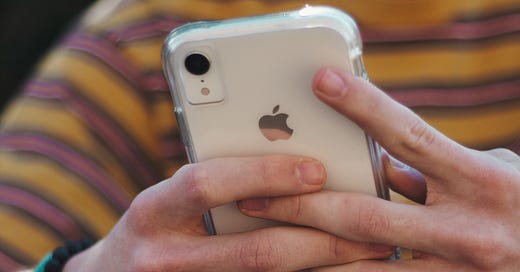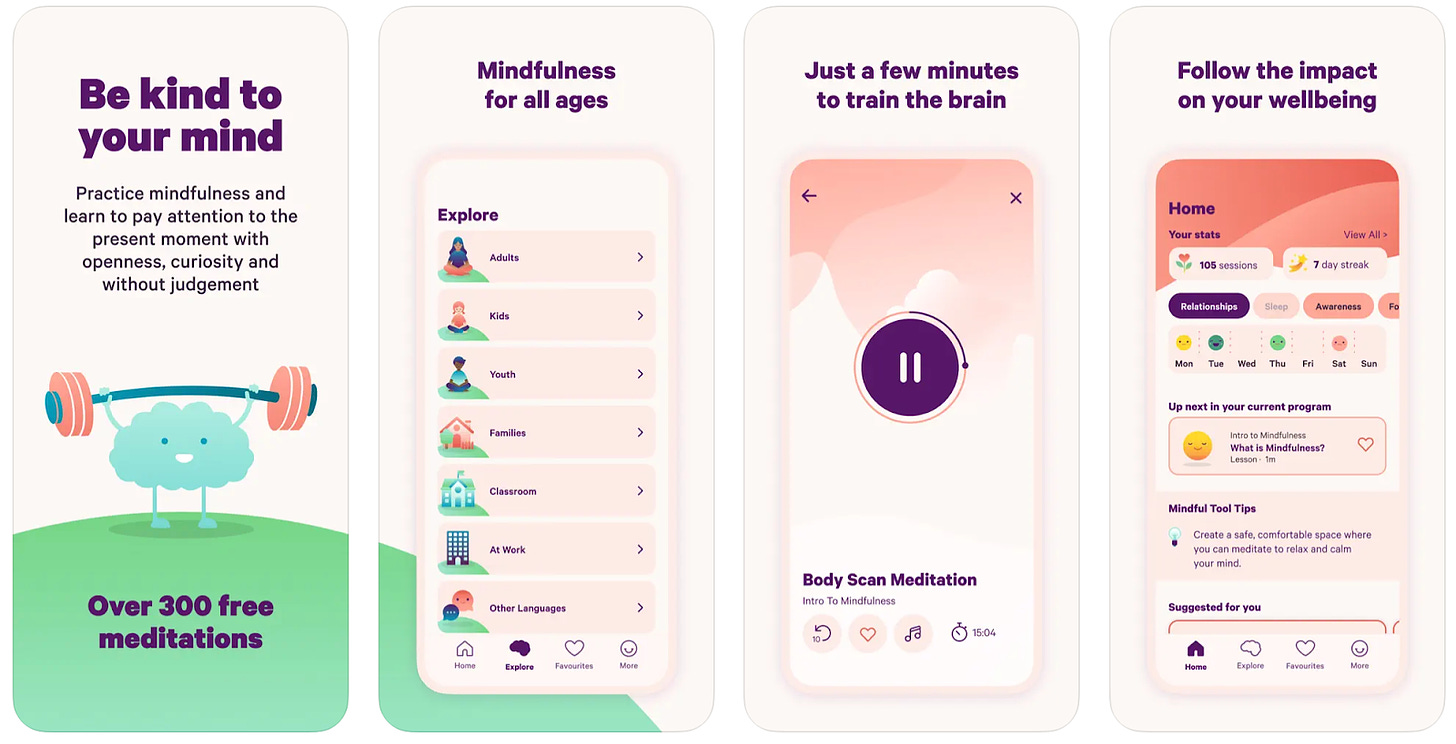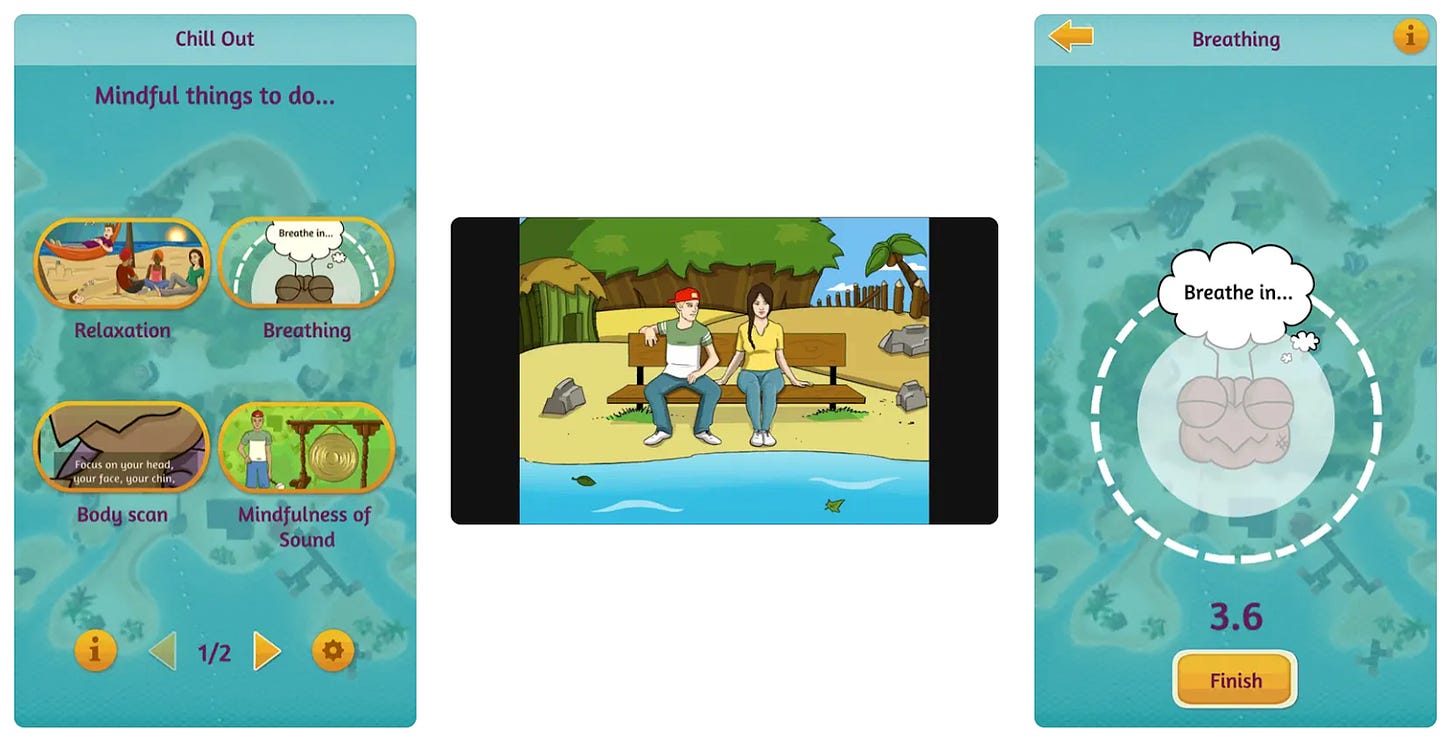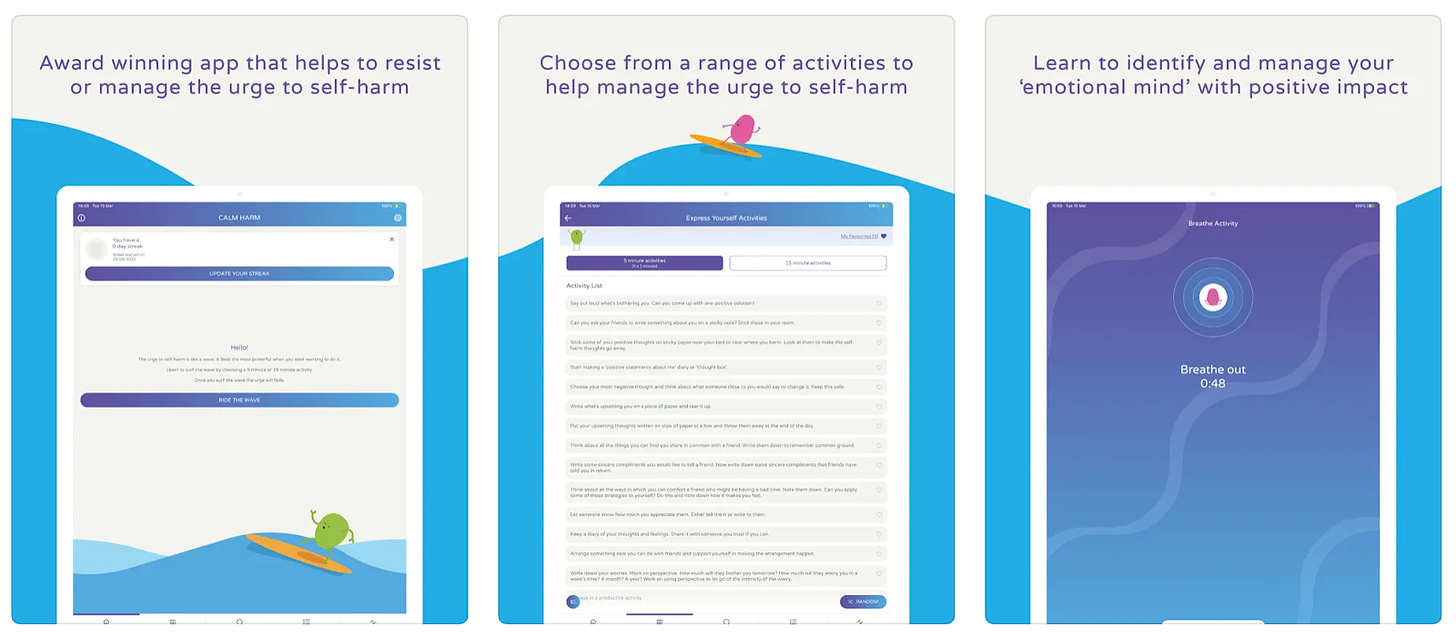Top mental health apps for teens
A new guide hunts down the best teen mental health apps, so we don't have to
Gather round, sapiens! Big news today: we’re bringing back Questions from Sapiens. Have a question about technology, psychology, and/or parenting? Submit your question here for a chance to have it answered in a future post.
5 min read
Have you ever searched “mental health” in the App Store? I had the great misfortune of doing so a few days ago, and here’s a sampling of what I came across:
An app that claimed to “train your brain” for “better wellness” with a game that looked suspiciously like Candy Crush
A weight-loss app that instructs users to “choose a body part” (presumably that they dislike?) in order to tailor diet and exercise advice
And my personal favorite, “Flutter: Starlight” which allows the user to “raise and collect cute moths in a magical, moonlit forest.”1 Fun and fey? Sure. Good for mental health? Probably not.
Apps that claim to support mental health have exploded in recent years, particularly those directed at teens. In fact, the youth digital mental health market has grown 15-fold in just the last 4 years, and it’s expected to be a $26 billion industry by 2027. Many of these apps offer new opportunities to help reduce stress, promote healthy behavior, and support mental health.
But of course, there are problems. Namely, an estimated 20,000 mental health apps available in the app store. That is too many apps2. And as my recent search reveals, many of them are not particularly good.
So, what’s a parent to do? How can we help our kids find mental health apps that actually work?
Enter: One Mind Psyberguide3, a non-profit dedicated to evaluating mental health apps. They recently published a new guide reviewing some of the best, research-backed apps for supporting teen mental health.
Here’s what they did: after searching the App Store and Google Play, reviewing the academic literature, and consulting with experts, they developed a list of 200 apps. They then narrowed down this list based on each app’s relevance for teens, availability, and research support. Ultimately, they landed on a list of 19 apps, all of which use evidence-based interventions and are specifically targeted to teens (though some are also appropriate for younger kids and/or adults).
Given my experience with just a brief foray into the abyss of the App Store, I am forever grateful that they did the work so we don’t have to.
What kind of mental health apps are out there?
One Mind breaks down currently available teen mental health apps into the following categories, based on the types of interventions they provide, and the “medium” through which they are delivered:
App intervention types:
Dialectical Behavior Therapy: teach users strategies associated with DBT, a therapy designed to support people with intense emotions.
Cognitive Behavior Therapy: teach users strategies associated with CBT, a therapy designed to help people identify and change harmful thought patterns and behaviors.
Meditation: teach users mindfulness techniques and encourage meditation
Gratitude: teach and encourage users to practice gratitude
App intervention medium:
Psychoeducation: provide education or information about mental health. Studies of traditional therapy show that this simple exercise, of learning more about a mental health condition, can be very effective for reducing symptoms.
Symptom tracking: help users track symptoms, moods, life events, triggers, behavior.
Chatbots: converse with users about mental health using AI. One Mind notes, helpfully, “people should be aware that they are speaking with a bot rather than a real person.”
Games: use interactive experiences, points, missions, and achievement to teach coping skills and provide resources.
In most cases, these apps are not a substitute for professional care. They can, however, provide a nice adjunct to traditional therapy, or promote general wellness among teens who might not need therapy at the moment.
You’ll note that none of these categories (unfortunately) involve collecting cute moths.
Which apps are best?
One Mind’s guide lists a total of 19 apps4. Here, I’m highlighting some of the apps on that list with the strongest research support:
1. Smiling Mind
Smiling Mind** (ages 3-19+). A free meditation app for all ages. One of the only apps on the list that earned the highest possible research rating. I created my own account, and was delighted to find that all the guided meditations are spoken in Australian accents (!).5
Good for: general well-being, stress, anxiety.
2. K’Bro
K’Bro (ages 8-19). According to Psyberguide: “an adventure-style game that provides five tools for documenting and coping with stressors.” Designed to help young users develop emotional resilience.
Good for: general well-being, stress, depression, anxiety.
3. Tellmi
Tellmi* (ages 11-25). An anonymous peer support app where young people can share their experiences and get support. All chat is moderated by humans, and in-house counselors step in for extra support when needed.
Good for: General well-being, stress, ADHD, depression, anxiety, grief, sleep
4. Mindful Gnats
Mindful Gnats* (ages 7-15). A game-based app designed to teach mindfulness skills. Guides kids through exercises like deep breathing and body scans. Graphics remind me a little bit of the 90s cartoon Doug, which is fun6.
Good for: general well-being, stress, anxiety.
5. Neolth
Neolth (ages 11-25). Designed for schools. Provides personalized activities, CBT and meditation skills for students, plus resources for teachers and administrators to help guide students through activities and track progress.
Good for: general well-being, ADHD, depression, anxiety
6. Apart of Me
Apart of Me (ages 11-18). Therapeutic game designed to support teens who are grieving a family member or friend who is terminally ill or has died. Users learn to “explore, accept, understand and articulate” the experience of grief.
Good for: Grief.
7. Clear Fear
Clear Fear (ages 11-19). CBT-based app that provides psychoeducation, symptom tracking, skills training, and breathing techniques to reduce anxiety and panic symptoms. Created by UK-based teen mental health charity stem4.
Good for: Anxiety.
8. Calm Harm
Calm Harm (ages 11-19). Also created by stem4, this DBT-based app provides skills and resources to help users resist the urge to self-harm.
Good for: Self-harm (only).
Not included in the guide…
My favorite mental health app is Headspace7. It’s good for kids and teens, too. I buy it every year when it is on sale, and then use it reliably to meditate for a few months before losing time, interest, motivation, or some combination of the three. Looking at My Activity History in the app, it appears I meditated nearly everyday prior to July (and, in total, have meditated 2,310 minutes since downloading the app). However, it also appears I’ve meditated a total of three times since July 29. I blame my son learning how to walk (i.e., more chasing, less sitting with eyes closed). But after spending so much time in the App Store this week, I think it’s time to dive back in. Wish me luck!
Have a favorite mental health app for your teen (or yourself)? Let us know in the comments!
A quick survey
What did you think of this week’s Techno Sapiens? Your feedback helps me make this better. Thanks!
The Best | Great | Good | Meh | The Worst
Want the full description of Flutter: Starlight from the App Store? No, not really? Here it is anyway: “Raise and collect cute moths in a magical, moonlit forest. You’ll soon discover moths are just as beautiful as butterflies in this relaxing game. Nurture moths through their incredible lifecycle, from adorable caterpillars to majestic moths…Behold their beauty and adorable quirks as they flutter and play!…Expand and adorn the forest with a vast array of plants with magical abilities, and discover other forest dwellers that have interesting tales to tell and mysteries to unravel. There is always something new to discover in Flutter Starlight, with more than 300 real-life moth species to collect and learn about!”
“Too many apps.” An appropriate phrase in this post. Never an appropriate phrase when out to dinner.
The full guide, including all 19 apps reviewed, can be found here. Also, check out One Mind Psyberguide’s comprehensive database of app reviews on their site.
Apps denoted ** have One Mind’s highest rating for research support: at least one peer-reviewed, published experimental study. Apps with * have the second-highest rating for research support: at least one peer-reviewed study that is not experimental (this is worse, because we can’t be quite as sure that the app actually caused any changes in behaviors or symptoms). No asterisk means the app is supported by pilot studies or other evaluations, but has not been supported by any published, peer-reviewed studies (this is worse because these studies haven’t been formally subjected to outside, expert opinions).
Also, note that these apps vary widely in terms of their commercial popularity. The guide is based on apps’ research support, not their number of downloads or reviews.
So many good things coming out of Australia! First koalas and Tim Tams, then Chris Hemsworth, and now this? Can’t wait to see what else they have in store for us.
Did anyone else know that Doug is available for immediate viewing on Disney+? Very curious if it holds up, particularly the Doug + Patti Mayonnaise dynamic.













Thanks for putting together this list. A few years ago while banging my head against the wall trying to get my toddler to sleep I found the app Moshi. We love it and have used it ever since! I use it regularly myself. It's geared toward a younger crowd, but is whimsical and soothing so I love it too. Lots of bedtime stories, lullabies, guided meditations, body scans, gratitude moments etc.
Thanks for compiling this.
I was wondering if you could elaborate on why psychoeducation works. Is there a difference between digital and offline psychoeducation? If yes, why?
Couldn't it also be possible that psychoeducation leads to increased stigma (a self-perception of being considered as a sick person)?